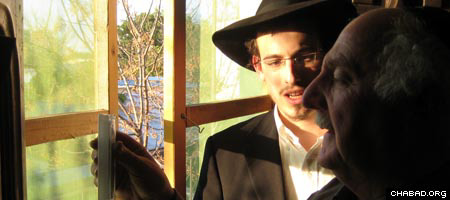In Uruguay, cows outnumber people five to one. Half of the South American nation's more than 3 million people live outside of its capital city, Montevideo, scattered across some 68,000 square miles. It counts as one of the least densely populated countries in the world.
It's Jewish population, as well, is small, scattered and largely unaffiliated. In short, reaching out to them in their rural hamlets was the quintessential "Roving Rabbis" mission.
This summer, two rabbinical students traveled from town to town under the aegis of Merkos L'Inyonei Chinuch, the educational arm of Chabad-Lubavitch, in search of Uruguay's Jews. They taught them a little Torah, helped them put up mezuzahs, donned tefillin with them, distributed Shabbat candles and, most importantly, strengthened their connection with their heritage.
"You people make me feel proud," said Marcos Gerestenbluth, speaking in broken English about the traveling emissaries. "When the rabbis come to visit, it is the best."
Gerestenbluth is something of a spokesman for Uruguay's rural Jews. He owns a clothing store in Paysandu, a village more than 230 miles from Montevideo.
According to the man, decades ago many Jews dotted Uruguay's countryside, having fled there from Eastern Europe before, during and after World War II. But over the past 15 years, whole communities have been emptied of their Jewish populations.
And although Montevideo boasts a full-time Chabad House under the direction of Rabbi Eliezer and Rochel Shemtov, for many in the backcountry, their only connection with the wider Jewish community is through the glossy magazine the Shemtovs mail out every year before the High Holidays and the summer visits from the rabbinical students.
Gerestenbluth said that he was grateful to the Shemtovs for keeping in touch and dispatching the traveling rabbis year after year.
"No one else does what they do," said Gerestenbluth. "I wish they could come more often. They are always welcome here."
All told, this year's team, Rabbis Yehoshua Chanowitz and Bentzion Shemtov, the son of the Montevideo emissaries, visited 102 families over a two-week period.
Shemtov, who studies in the United States for the rest of the year, said that meeting Jews in small towns was quite an experience for him and his partner. As an example, he pointed to Bernardo Brysk, one of Bella Union's last two remaining Jews. They helped him affix a mezuzah to his door.
"These people want to connect to Judaism, but they have no way to express it," said Shemtov. "We're thankful we got to help them."
For his part, Gerestenbluth said that he will never forget the student visits. He, in fact, waits for them: "They are all fine people, very fine people," he said. "They have a mission and they do it well."







Join the Discussion